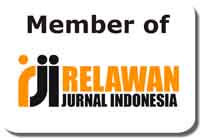The Representation of Citizenship Values in Arabic Textbooks: Marrying Delanty and Hopkins Concepts
Abstract
Although research on citizenship values in language textbooks has been widely documented, little is known about citizenship values in Arabic textbooks at Indonesian Islamic Junior High Schools. To extend this scholarship, the present study examines the values of citizenship in those textbooks and how they are presented. Data collection was carried out using document analysis techniques in three textbooks. Data analysis was carried out using a combination of Delanty and Hopkins concepts of citizenship values. The findings revealed that eight aspects of civic values are found in textbooks presented in reading materials, conversations and training materials. They are honesty (1.23%), rights (6.79%), courage (8.33%), compassion (15.43%), participation (15.74%), respect (16.35%), identity (17.90%), and responsibility (18.20%). This finding implies that Arabic textbooks in Indonesian Islamic Junior High Schools should be conducted by incorporating citizenship values equally, such as honesty, rights, and courage. Since students are supposed to become the nation's successors who have allegiance to the state, nation, and religion, these values should be instilled in them from an early age.
Keywords
Full Text:
PDFReferences
Abdi, A. A., Shizha, E., & Bwalya, I. (2006). Recasting postcolonial citizenship through civic education: Critical perspectives on Zambia.
Al-Qatawneh, S. S., Alsalhi, N. R., & Eltahir, M. E. (2019). The citizenship values included in intermediate stage Arabic-language textbooks and teachers’ awareness of them in the UAE: A case study. Heliyon, 5(11), e02809. https://doi.org/10.1016/j.heliyon.2019.e02809
Al-Rub, I. O. A. (2021). The Values of Citizenship Included in the Palestinian Arabic-Language Textbooks for the Lower Basic Education. British Journal of Education, 9(2), 96–111.
Alhumidi, H. A. (n.d.). Citizenship values included in the Arabic language books of reading and literature passages of secondary schools in the State of Kuwait.
Althof, W., & Berkowitz*, M. W. (2006). Moral education and character education: their relationship and roles in citizenship education. Journal of Moral Education, 35(4), 495–518. https://doi.org/10.1080/03057240601012204
Azra, A. (2001). Pendidikan Akhlak dan Budi Pekerti: Membangun Kembali Anak Bangsa [Moral and Moral Education: Rebuilding the Nation’s Children. Mimbar Pendidikan, 1(XX), 24–19.
Banks, J. A. (2004). Handbook of research on multicultural education.
Baraka, P. E. (2008). Citizenship education in Egyptian public schools: What values to teach and in which administrative and political contexts. Journal of Education for International Development, 3(3), 1–18.
Beaman, J. (2016). Citizenship as cultural: Towards a theory of cultural citizenship. Sociology Compass, 10(10), 849–857. https://doi.org/10.1111/soc4.12415
Beyer, P. (2007). Globalization and the institutional modeling of religions. In Religion, Globalization, and Culture (pp. 167–186). Brill.
Biesta, G. J. (2011). Learning democracy in school and society: Education, lifelong learning, and the politics of citizenship. Springer Science & Business Media.
Buckner, E., & Russell, S. G. (2013). Portraying the global: Cross-national trends in textbooks’ portrayal of globalization and global citizenship. International Studies Quarterly, 57, 738–750.
Byram, M. (2008). From foreign language education to education for intercultural Citizenship. Multilingual Matters.
Chen, Y., & Reid, I. (2002). Citizenship education in Chinese schools: Retrospect and prospect. Research in Education, 67(1), 58–69.
Choi, Y., & Kim, Y. (2020). Deconstructing neoliberalism in global citizenship discourses: an analysis of Korean social studies textbooks. Critical Studies in Education, 61(4), 464–479.
Davidson, R., & Liu, Y. (2020). Reaching the world outside: cultural representation and perceptions of global citizenship in Japanese elementary school English textbooks. Language, Culture and Curriculum, 33(1), 32–49.
De La Caba Collado, M., & López Atxurra, R. (2006). Democratic citizenship in textbooks in Spanish primary curriculum. Journal of Curriculum Studies, 38(2), 205–228. https://doi.org/10.1080/00220270500153823
Delanty, G. (2000). Citizenship in a global age: Society, Culture. Politics, 4.
Feldman, S. S., Elliott, G. R., & Elliott, G. (1990). At the threshold: The developing adolescent (Eds) (ed.)). Harvard University Press.
Geijsel, F., Ledoux, G., Reumerman, R., & ten Dam, G. (2012). Citizenship in young people’s daily lives: differences in citizenship competences of adolescents in the Netherlands. Journal of Youth Studies, 15(6), 711–729. https://doi.org/10.1080/13676261.2012.671932
Hahn, C. L. (1999). Citizenship education: An empirical study of policy, practices and outcomes. Oxford Review of Education, 25(1–2), 231–250.
Hall, J. (1963). Comparative law and social theory. Louisiana State University Press.
Harijanti, S. D., Prasetianingsih, R., & Dewansyah, B. (2007). Politik Hukum Kewarganegaraan Indonesia. FH Unpad.
Hasanen, M. M., Al-Kandari, A. A., & Al-Sharoufi, H. (2014). The role of English language and international media as agents of cultural globalisation and their impact on identity formation in Kuwait. Globalisation, Societies and Education, 12(4), 542–563.
Hendry, L. B., Roberts, W., Glendinning, A., & Coleman, J. C. (1992). Adolescents’ perceptions of significant individuals in their lives. Journal of Adolescence, 15(3), 255–270.
Homana, G., Barber, C., & Torney-Purta, J. (2006). Assessing School Citizenship Education Climate: Implications for the Social Studies. Center for Information and Research on Civic Learning and Engagement (CIRCLE), University of Maryland.
Hoon, C. Y. (2013). Multicultural citizenship education in Indonesia: The case of a Chinese Christian school. Journal of Southeast Asian Studies, 44(3), 490–510.
Hopkins, G. (2002). Teaching citizenship’s five themes. Education World.
Ibrahim, T. (2005). Global citizenship education: Mainstreaming the curriculum? Cambridge Journal of Education, 35(2), 177–194.
Isin, E. F., & Turner, B. S. (2007). Investigating citizenship: An agenda for citizenship studies. Citizenship Studies, 11(1), 5–17.
Kolstø, S. D. (2000). Consensus projects: Teaching science for citizenship. International Journal of Science Education, 22(6), 645–664.
Komalasari, K., & Saripudin, D. (2017). A model of living values education-based civic education textbooks in Indonesia. The New Educational Review, 47(1), 139–150.
Komara, E. (2017). Curriculum and civic education teaching in Indonesia. EDUCARE, 10(1), 23–32.
Kumaravadivelu, B. (2012). Individual identity, cultural globalization, and teaching English as an international language. In Principles and practices for teaching English as an international language (p. 9).
Lebrun, J., Lenoir, Y., Laforest, M., Larose, F., Roy, G. R., Spallanzani, C., & Pearson, M. (2002). Past and current trends in the analysis of textbooks in a Quebec context. Curriculum Inquiry, 32(1), 51–83.
McConachy, T. (2018). Critically engaging with cultural representations in foreign language textbooks. Intercultural Education, 29(1), 77–88.
Numan Somantri. (1972). Beberapa Masalah dalam Pengajaran PKn. Tawangmangu.
Osler, A., & Starkey, H. (2006). Education for democratic citizenship: A review of research, policy and practice 1995–2005. Research Papers in Education, 21(4), 433–466.
Piattoeva, N. (2005). Citizenship education as an expression of democratization and nation-building processes in Russia. European Education, 37(3), 38–52.
Pinson, H. (2007). Inclusive curriculum? Challenges to the role of civic education in a Jewish and democratic state. Curriculum Inquiry, 37(4), 351–382.
Porto, M., Houghton, S. A., & Byram, M. (2018). Intercultural citizenship in the (foreign) language classroom. Language Teaching Research, 22(5), 484–498.
Ramirez, F. O., Meyer, J. W., & Wotipka, C. M. (2009). Globalization, citizenship, and education: The rise and spread of cosmopolitan, multicultural, and individual empowerment frames. Peruvian Education Review, 1, 163–180.
Rashidi, N., & Ghaedsharafi, S. (2015). An Investigation into the culture and social actors representation in summit series ELT textbooks within van Leeuwen’s 1996 framework. Sage Open, 5(1).
Shan, L. C. (2011). Challenges to teaching citizenship education in Hong Kong after the handover.
Sigauke, A. T. (2012). Young people, citizenship and citizenship education in Zimbabwe. International Journal of Educational Development, 32(2), 214–223.
Simpson, J., & Weiner, E. (1989). The Oxford English Dictionary (20 Volume Set. Oxford University Press.
Sperling, E. (2009). “More than particle theory”: Action-oriented citizenship through science education in a school setting. Journal for Activist Science and Technology Education, 1(2).
Starkey, H. (2002). Democratic citizenship, languages, diversity and human rights. Retrieved July, 29, 2010.
Tan, B. P., Naidu, N. B. M., & Jamil, Z. (2018). Moral values and good citizens in a multi-ethnic society: A content analysis of moral education textbooks in Malaysia. The Journal of Social Studies Research, 42(2), 119–134.
Wellington, J. (2003). Science education for citizenship and a sustainable future. Pastoral Care in Education, 21(3), 13–18.
DOI: http://dx.doi.org/10.31332/lkw.v0i0.3927
Copyright (c) 2022 St Kuraedah

This work is licensed under a Creative Commons Attribution-ShareAlike 4.0 International License.
Langkawi: Journal of The Association for Arabic and English indexed by:


















.png)
.png)

.png)
2.png)








